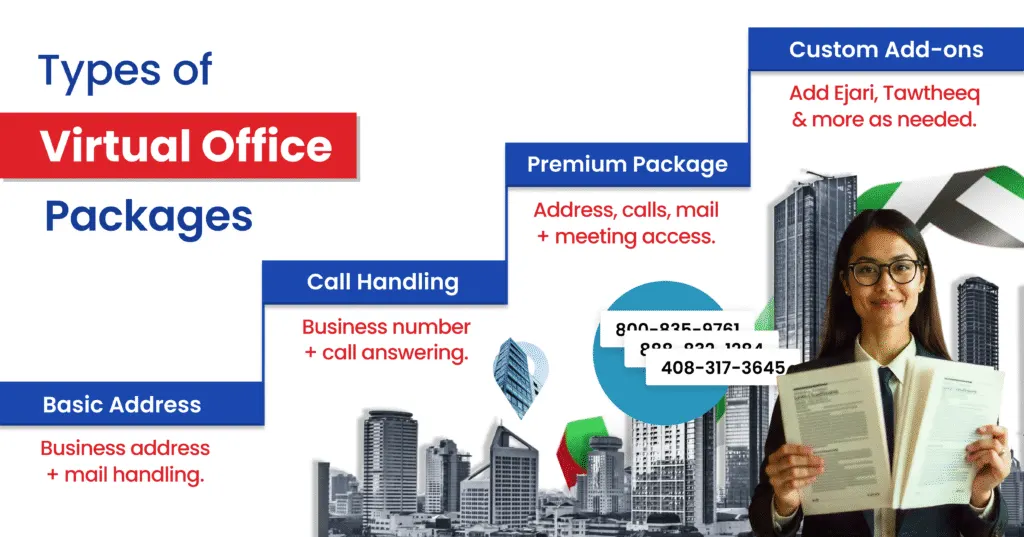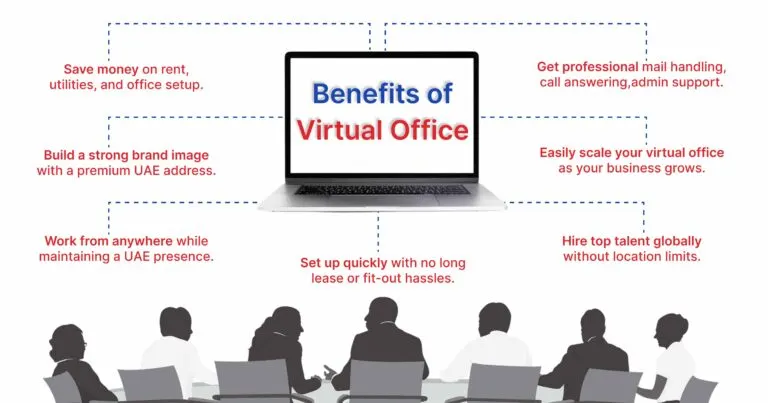Using a Virtual Office set-up for your business is legal in the UAE, but it comes with specific rules. The most important rule is that you still need a valid trade license to operate legally.
Here’s a general roadmap for getting your license with a Virtual Office business setup:
Step 1: Choose Your Jurisdiction Carefully
The first and most important decision is selecting where to register your business. In the UAE, you can choose between a Mainland business setup under the Department of Economic Development (DED) or one of the many Free Zones like IFZA, DMCC, or RAKEZ. Your choice will influence license types, visa eligibility, ownership rules, and virtual office requirements.
Free Zones business setup generally provide more flexibility and cost-effective virtual office options, while the Mainland requires a physical address registered with Ejari.
Note: Offshore companies in the UAE cannot typically use a virtual office within the country because they are not allowed to have a physical presence or conduct business locally.
Step 2: Define Your Business Activity
Before applying for your license, you must clearly define your business activity. Each jurisdiction, Mainland or Free Zone, offers a list of approved activities. These range from consultancy, e-commerce, marketing, IT services, to trading.
Step 3: Reserve a Trade Name
Once you’ve selected your activity, propose a unique business name to the relevant authority. The name should follow UAE naming guidelines, no offensive terms, no religious references, and no abbreviations of your name unless full names are used.
Free Zones typically offer faster name approval, while DED might take longer. Name reservation fees apply and usually remain valid for 30–60 days.
Step 4: Choosing the Right Office Space Virtual Package in the UAE
Choose a virtual office solution from a provider approved by your licensing authority. In Free Zones, these are called flexi-desks or smart offices. On the Mainland, your office address must be Ejari-registered.
Packages vary: basic ones include just the address; premium packages offer receptionist support, mail forwarding, call answering, and even occasional access to meeting rooms.
Many providers allow you to rent a Virtual Office address and then add other services as you need them. Free Zones often offer bundled licensing with flexi-desk or office space virtual options that fulfill legal requirements for trade licenses.
Step 5: Prepare & Submit All Required Documents in Advance
Proper documentation ensures smooth approval. Gather key documents: passport copy, Emirates ID (if applicable), visa page, passport-size photo, and tenancy contract (Ejari for Mainland). Free Zones may ask for a No Objection Certificate (NOC) if you’re currently sponsored.
Step 6: Apply for Initial Approval from the Licensing Authority
With your documents in order, apply for initial approval. This is a pre-approval that confirms your business activity and documents meet all legal standards. The process can take 1–3 days, depending on the authority.
You’ll receive a notification once approved, after which you can proceed to the final registration and payment stages.
Step 7: Pay Applicable Fees for Your License & Office Setup
Once approved, a payment voucher will be issued. This includes license fees, trade name reservation charges, registration costs, and sometimes the virtual office fee if bundled.
Free Zones often offer all-inclusive packages, while DED separates office rental and license fees. Keep the receipt for future renewals or visa-related processes.
Step 8: Get Your Official Business License Issued Digitally
After payment, your license will be issued, often digitally via email or an online portal. This license is your legal document allowing you to operate in the UAE. With it, you can start invoicing clients, applying for visas, and opening a business bank account.
Step 9: Apply for Establishment Card and Visa Quota (Optional)
If you plan to sponsor yourself, employees, or dependents, you’ll need an establishment card and a visa quota. This step involves immigration processes and is available for both Free Zone and Mainland companies. Virtual office license holders may have limited visa eligibility depending on their package and business activity.
Step 10: Open a Corporate Bank Account Using Your License
Use your trade license, Emirates ID (if applicable), tenancy contract, and shareholder documents to open a UAE business bank account. Choose a bank that aligns with your business size, transaction volume, and nationality preferences. Some Free Zones have partnerships that simplify this step.
Need Help with a Smooth Setup?
Contact Safe Ledger today for expert guidance and a seamless business launch in the UAE.




